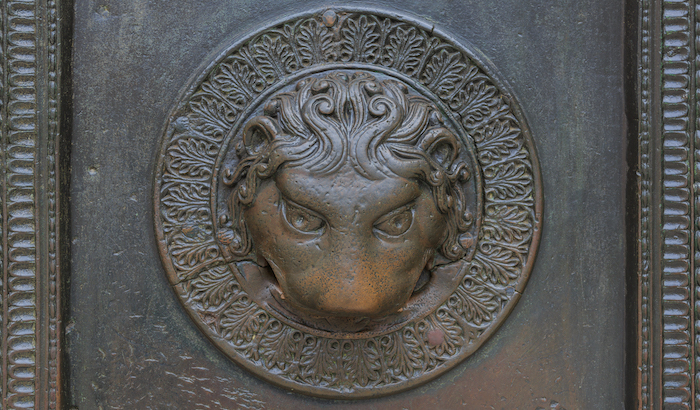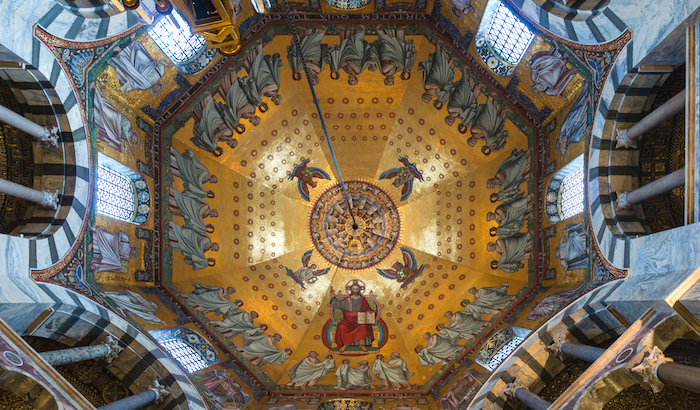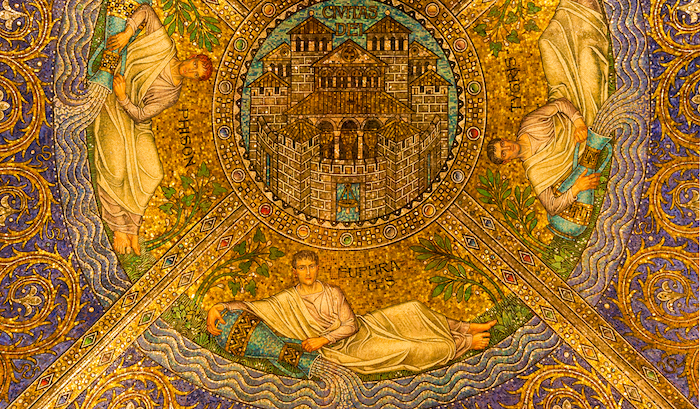Around 884 A.D., an anonymous monk (tentatively identified as Notker the Stammerer) in what is today Switzerland penned a compilation of anecdotes in an attempt to ingratiate himself with King Charles the Fat. The anecdotes were mostly excuses to praise Charles’ great-grandfather, Charlemagne. As Notker was writing 70 years after Charlemagne’s death, these stories – little more than rumors he’d once overheard – had clearly grown wild in the retelling. Charlemagne’s bishops got an especially colorful – and gameable – treatment. Let’s dive right in!
This post is brought to you by beloved Patreon backer Arthur Brown. Thanks for helping keep the lights on! If you want to help keep this blog going alongside Arthur, head over to the Patreon page – and thank you!

Photo by CEphoto, Uwe Aranas / CC-BY-SA-3.0.
Notker didn’t name any of these bishops, but we can identify Riculf, Archbishop of Mainz, by his description. Whether Notker intended to describe Riculf or whether he just described a generic powerful bishop and only Riculf happened to fit the bill is a different – and unanswerable – question. Nonetheless, Riculf is the target of several nasty stories.
In one, Charlemagne heard that Riculf had a habit of buying rare, extravagant and stupid things. The King thought to teach Riculf a lesson. He reached out to a merchant who made the rounds between Frankia (where our story is set) and the Holy Land. Charlemagne asked the merchant to cheat and deceive Riculf in any way he could.
The merchant killed a mouse, stuffed it with spices, and presented it to Riculf as a never-before-seen animal he picked up in Judea. Riculf offered him three pounds of silver for it. “I’d rather throw it in the sea than sell it so cheap!” Riculf tried again with ten pounds. “Ten pounds of silver? That wouldn’t even cover the cost to bring it here from Judea!” Riculf offered twenty pounds. The merchant turned to walk out the door. Riculf caved and offered a price so ridiculous the merchant opted not to push his luck further, sold the mouse, and returned to Charlemagne to hand over the silver. Charlemagne publicly shamed Riculf, but let him keep his bishopric. Notker doesn’t tell us what happened to the dead mouse.
This presents a delightful adventure hook: a ruler in your fictional campaign setting asks the PCs to cheat a spendthrift official to shame them. Let your players come up with a plan that suits their characters, then run it to see how it turns out. Throw in a couple unexpected complications to keep things interesting. Maybe the spendthrift official has a trusted advisor who smells something fishy. Maybe an NPC gets wind of the PCs’ plan and demands a favor not to reveal it.

In another Riculf story, Charlemagne decreed that his bishops hadn’t been ministering enough to their flocks, and that every bishop should give a sermon in their cathedral before a certain date or be stripped of their bishopric. Riculf was worried. He enjoyed the great wealth he received as a bishop, and didn’t want to risk dismissal. So before he gave his sermon, he invited two nobles from Charlemagne’s court to attend, so they could report back to the King that Riculf had followed his edict.
The sermon didn’t go well. When Riculf was about to speak, he became distracted by an odd sight. In the back of the cathedral, a man was wearing a boot as a hat! Riculf ordered his sexton to grab the man and haul him up front. The boot-man resisted, afraid he was about to be punished for having his head covered in the house of God. Riculf shouted and yelled from the pulpit at the resisting man (interrupting the sacred Mass!), and the sexton eventually got the boot-man up front. There, Riculf yanked the boot from the man’s head, revealing his shame to the whole congregation: the boot-man was self-conscious about having red hair, and, being too poor to own a hat, was trying to cover it up any way he could. The rest of the Mass passed without incident.
After the Mass, Riculf invited his two noble guests to join him for dinner. Notker devotes considerable ink to describing the luxury of the meal and of Riculf’s palace more generally. “He seemed a king except for the scepter and the title.” The next morning, Riculf was ashamed of the extravagance he’d displayed before his noble guests. He plied them with lavish gifts and begged them to tell Charlemagne of his goodness, of the simplicity of his lifestyle, and how he’d followed the King’s order to give a sermon.
When the two nobles got back to Charlemagne, they tried to pass along Riculf’s half-truths. But Charlemagne was clever, and ferreted the truth out of them. And while Charlemagne was disturbed by what he’d heard, he recognized that Riculf was clearly terrified of him. Confident in the bishop’s loyalty, he overlooked Riculf’s incompetence and permitted him to remain a bishop.
The adventure hook here is for the PCs to take the place of the nobles reporting back to your (fictional) great king. Confronted with these scenes of excess, does the party dig deeper for wrongdoing? Do the PCs try to determine why your Riculf-analogue hates redheads? Do they accept the bribe? Do they investigate whether Riculf is doing more than playing at regal extravagance, whether he may be plotting a rebellion? And most importantly: does the party tell the King the truth when they return to him?

The bishop in this next story is never named, but we know he supposedly practiced extraordinary virtue. The Devil, so the story goes, was understandably upset about this. So during Lent (when eating meat is forbidden), the Devil aroused in the bishop a great craving for meat, a need so fierce the bishop was sure he would die if he didn’t get some. The bishop’s advisors were sensible people and gave the appropriate answer: “This is clearly a medical issue, so it’s just fine to eat some meat to save your life.” The bishop did so, and then the Devil caused the bishop to realize exactly what had happened.
The bishop was stricken with grief. Again, his advisors gave him the standard advice: “The Devil deceives people all the time. Just do some fasting, a little almsgiving, and repent. You’ll be fine.” This was not enough for this saintliest of bishops. On Easter Sunday, he ordered everyone in the city to roll their wine-vats into the street, fill them with water, and heat the water up. Then, from dawn to dusk, the bishop bathed every man in the city. He shaved everyone who wanted shaving, drained the pus of everyone with a boil, scraped off everyone’s ingrown hairs, and clad every bather in white at his own expense. His penitence done, his conscience clear, he at last washed himself and walked towards the cathedral at the head of his flock to perform the Easter Mass.
But the Devil had one last trick for this bishop! He took the form of the filthiest, most leprous beggar and leapt out from behind the church. “Ha ha!” crowed the Devil, “You didn’t get everyone! Your penitence is incomplete and you are wicked in the eyes of God!” But the bishop recognized the Devil and would not be deterred. He ordered more water heated up! He seized the Devil and began shaving him. Every time the bishop shaved one part of the Devil’s filthy throat, the hair grew back in another. This continued until a great eye opened in the middle of the Devil’s windpipe. The bishop leapt back and crossed himself in the name of Christ. The Devil could not bear the holy name and disappeared in a puff of smoke.
At your table, if your PCs have to perform some sort of penance in a supernatural setting, this story presents a way to make it fun. Get the Devil involved! Have Satan (or your setting’s equivalent) actively try to mess up whatever they’re doing by being personally present!

Our final story is another tale about a nameless bishop and the Devil. In Charlemagne’s holdings in Italy, there was a bishop who collected useless things. The Devil thought of a way to use this habit to bring the bishop down. He sought out a poor miser and promised him riches if he’d consent to a partnership. The miser agreed. So the Devil turned himself into a very fine mule and had the miser ride the mule over to the bishop’s house. The bishop offered to buy the mule, but the miser – acting on the Devil’s instructions – declined. The bishop raised his price again and again until it reached a preposterous sum and the miser – on the Devil’s orders – agreed reluctantly to sell the mule.
The bishop was so excited, he couldn’t wait to ride his new steed. He mounted the mule that very day, intending to ride through his city and show off. The-Devil-as-mule took off running, bishop clinging to his back. He carried the terrified bishop this way and that until they came to a whirlpool. The mule leapt in, intending to drag the bishop down with him to Hell! Fortunately, some fishermen happened to be close by and managed to pull the bishop out.
This is a great adventure hook. You’re passing by a whirlpool, and here comes a galloping mule ridden by a panicked bishop (or whatever your setting’s equivalent might be). Can you rescue him? Can you trace the mule back to its original owner? Can you overcome the protections the Devil is sure to provide to his loyal servant? If you succeed, what is to be done with the money the bishop paid for the mule? Should it be given back to the foolish clergyman? Should the PCs keep it as their fee? Ought it be given to the poor?
–
Also, have I mentioned recently that I talk about this content on the Dicegeeks Podcast? If you prefer to get your content in audio form, here are three recent episodes I was on.






